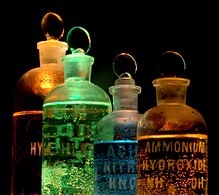 |
| Solutions of
substances in reagent bottles, including
ammonium hydroxide and nitric acid, illuminated
in different colors. |
Concepts
Chemistry is the science of atomic matter (matter that
is composed of chemical elements), especially its
chemical reactions, but also including its properties,
structure, composition, behavior, and changes as they
relate to the chemical reactions. Chemistry is centrally
concerned with atoms and their interactions with other
atoms, and particularly with the properties of chemical
bonds.
Chemistry is the scientific discipline involved with
elements and compounds composed of atoms, molecules and
ions: their composition, structure, properties, behavior
and the changes they undergo during a reaction with
other substances. |
|